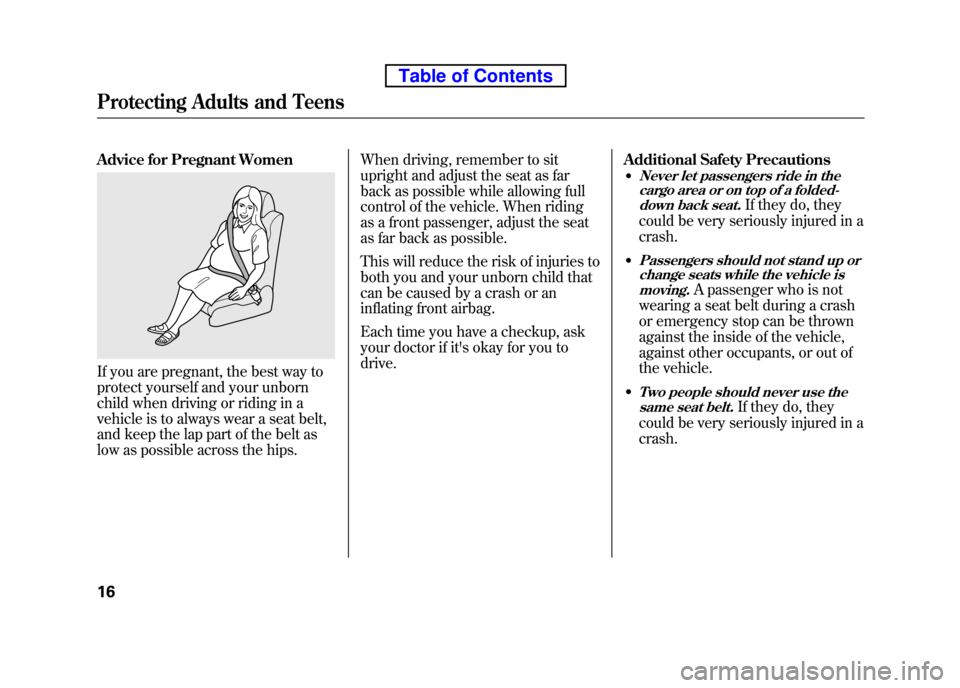change time HONDA ELEMENT 2010 1.G Owners Manual
[x] Cancel search | Manufacturer: HONDA, Model Year: 2010, Model line: ELEMENT, Model: HONDA ELEMENT 2010 1.GPages: 342, PDF Size: 5.76 MB
Page 3 of 342

Cup Holders................................. 99
Customer Service .......................322
D
DANGER, Explanation of .............iii
Dashboard ............................... 3, 56
Daytime Running Lights ..............72
Daytime Running Lights
Indicator ................................... 60
Dead Battery .............................. 291
Defects, Reporting Safety (U.S. only) ....................................... 324
Defogger, Rear Window ...............74
Dimensions ................................ 308
Dimming the Headlights ..............71
Dipstick Automatic Transmission .........256
Engine Oil ............................... 201
Directional Signals .................60, 71
Disc Brake Wear Indicators .......225
Disc Care ................................... 183
Disc Changer Error
Messages ............................... 126Disc Player Error
Messages ........................ 125, 148
Disposal of Used Oil ...................253
Doors
Indicator ................................... 11
Locking and Unlocking ............80
Power Door Locks ...................80
DOT Tire Quality Grading (U.S. Vehicles) ................................ 311
Downshifting, Manual Transmission .......................... 217
Driver and Passenger Safety ..........5
Driving ....................................... 213
Economy ................................. 202
Driving Guidelines .....................214
Dust and Pollen Filter ................269
E
Economy, Fuel ........................... 202
Emergencies on the Road ..........281
Battery, Jump Starting .............291
Brake System Indicator .....58, 297
Changing a Flat Tire ...............283Charging System
Indicator ........................ 58, 295
Checking the Fuses ................298
Driving with a Flat Tire ...........282
Hazard Warning Flashers ........73
Jump Starting .......................... 291
Low Oil Pressure
Indicator ........................ 58, 295
Malfunction Indicator Lamp ............................. 58, 296
Overheated Engine .................293
Towing .................................... 303
Emergency Brake ........................94
Emergency Flashers ....................73
Emergency Towing ....................303
Emissions Controls ....................316
Emissions Testing ......................319
CONTINUED
Index
III
INDEX
Page 10 of 342

Tailgate........................................ 82
Open Indicator ......................... 61
Opening the ............................. 82
Taillights, Changing Bulbs in .....266
Taking Care of the Unexpected ............................ 281
Technical Descriptions
DOT Tire Quality Grading (U.S. Vehicles) ............................. 311
Emissions Control Systems .....316
Three Way Catalytic
Converter ............................ 318
Tire Labeling ........................... 313
Tire Pressure Monitoring System (TPMS) -Required Federal
Explanation ...................... 314
Temperature Gauge .....................67
Tensioners, Seat Belts ..................20
Tether Anchorage Points .............48
Theft Protection, Radio ..............188
Three Way Catalytic
Converter ............................... 318
Tilt the Steering Wheel ................74
Time, Setting the ........................189
Tire Chains ................................ 276
Tire, How to Change a Flat ........283 Tire Information
.........................313
Tire Labeling .............................. 313
Tire Pressure Monitoring System (TPMS) ........................... 227, 314
Tires .......................................... 271
Air Pressure ............................ 272
Chains ..................................... 276
Checking Wear .......................273
Compact Spare ........................282
DOT Tire Quality Grading (U.S. Vehicles) ............................. 311
Inflation ................................... 271
Inspection ............................... 273
Labeling .................................. 313
Low Tire Pressure
Indicator ........................ 62, 227
Maintenance ........................... 274
Pressure Monitoring System ...227
Replacing ................................ 274
Rotating .................................. 274
Snow ....................................... 275
Specifications .......................... 310
Tools, Tire Changing .................283
Towing A Trailer .................................. 232
Emergency Wrecker ...............303TPMS (Tire Pressure Monitoring
System) .............................. 227
Indicator ............................ 63, 228
Required Federal
Explanation ......................... 314
Transmission Checking Fluid Level,
Automatic ............................ 256
Checking Fluid Level, Manual ................................ 257
Fluid Selection ................256, 257
Identification Number .............306
Shifting the Automatic .............219
Shifting the Manual .................217
Treadwear .................................. 311
Trip Meter ................................... 66
Turn Signals ................................. 60
Turn Signals and Headlights ........71
U
Unexpected, Taking Care of the .......................................... 281
Uniform Tire Quality Grading (U.S. only) .............................. 311
Index
X
Page 12 of 342

OWNER_________________________________________________________
______________________________________________________________________________
ADDRESS _______________________________________________________
STREET
_________________________________ _________________________________ ___________________ CITY STATE/PROVINCE/TERRITORY ZIP CODE/ POSTAL CODE
V. I. N. ___________________________________________________________
DELIVERY DATE __________________________________________________
(Date sold to original retail purchaser)
DEALER NAME ___________________ DEALER NO. ___________________
ADDRESS _______________________________________________________
STREET
_________________________________ _________________________________ ___________________ CITY STATE/PROVINCE/TERRITORY ZIP CODE/ POSTAL CODE
OWNER'S SIGNATURE ___________________________________________
DEALER'S SIGNATURE ___________________________________________ This owner's manual should be considered a
permanent part of the vehicle and should
remain with the vehicle when it is sold.
This owner's manual covers all models of the
Element. You may find descriptions of
equipment and features that are not on your
particular model.
The information and specifications included
in this publication were in effect at the time of
approval for printing. Honda Motor Co., Ltd.
reserves the right, however, to discontinue or
change specifications or design at any time
without notice and without incurring any
obligation whatsoever.
POUR CLIENTS CANADIEN
AVIS IMPORTANT: Si vous avez
besoin d'un Manuel du Conducteur
en français, veuillez demander à
votre concessionnaire de
commander le numéro de pièce33SCVC70
Owner's Identification
Page 22 of 342

You'll find many safety
recommendations throughout this
section, and throughout this manual.
The recommendations on this page
are the ones we consider to be the
most important.
Always Wear Your Seat Belt
A seat belt is your best protection in all
types of collisions. Airbags are
designed to supplement seat belts, not
replace them. So even though your
vehicle is equipped with airbags, make
sure you and your passengers always
wear your seat belts, and wear them
properly (see page 14).
Restrain All Children
Children age 12 and under should ride
properly restrained in a back seat, not
the front seat. Infants and small
children should be restrained in a
child seat. Larger children should use
a booster seat and a lap/shoulder belt
until they can use the belt properly
without a booster seat (see pages35-51). Be Aware of Airbag Hazards
While airbags can save lives, they can
cause serious or fatal injuries to
occupants who sit too close to them, or
are not properly restrained. Infants,
young children, and short adults are at
the greatest risk. Be sure to follow all
instructions and warnings in thismanual.
Don't Drink and Drive
Alcohol and driving don't mix. Even one
drink can reduce your ability to respond
to changing conditions, and your
reaction time gets worse with every
additional drink. So don't drink and
drive, and don't let your friends drink
and drive, either.
Pay Appropriate Attention to the
Task of Driving Safely
Engaging in mobile phone conversation
or other activities that keep you from
paying close attention to the road, other
vehicles and pedestrians could lead to a
crash. Remember, situations can
change quickly, and only you can
decide when it is safe to divert attention
away from driving. Control Your Speed
Excessive speed is a major factor in
crash injuries and deaths. Generally, the
higher the speed, the greater the risk,
but serious injuries can also occur at
lower speeds. Never drive faster than is
safe for current conditions, regardless
of the maximum speed posted.
Keep Your Vehicle in Safe Condition
Having a tire blowout or a mechanical
failure can be extremely hazardous. To
reduce the possibility of such problems,
check your tire pressures and condition
frequently, and perform all regularly
scheduled maintenance (see page 243).
Important Safety Precautions
6
Table of Contents
Page 32 of 342

Advice for Pregnant Women
If you are pregnant, the best way to
protect yourself and your unborn
child when driving or riding in a
vehicle is to always wear a seat belt,
and keep the lap part of the belt as
low as possible across the hips.When driving, remember to sit
upright and adjust the seat as far
back as possible while allowing full
control of the vehicle. When riding
as a front passenger, adjust the seat
as far back as possible.
This will reduce the risk of injuries to
both you and your unborn child that
can be caused by a crash or an
inflating front airbag.
Each time you have a checkup, ask
your doctor if it's okay for you to drive.
Additional Safety Precautions
●
Never let passengers ride in the
cargo area or on top of a folded-
down back seat.
If they do, they
could be very seriously injured in a crash.
●
Passengers should not stand up or change seats while the vehicle is
moving.
A passenger who is not
wearing a seat belt during a crash
or emergency stop can be thrown
against the inside of the vehicle,
against other occupants, or out of
the vehicle.
●
Two people should never use the same seat belt.If they do, they
could be very seriously injured in acrash.
Protecting Adults and Teens
16
Table of Contents
Page 76 of 342

Immobilizer System Indicator
This indicator comes on for a few
seconds when you turn the ignition
switch to the ON (II) position. It will
then go off if you have inserted a
properly coded ignition key. If it is
not a properly coded key, the
indicator will blink, and the engine
will not start (see page 76).
This indicator also blinks several
times when you turn the ignition
switch from the ON (II) position to
the ACCESSORY (I) or LOCK (0) position.Turn Signal and
Hazard WarningIndicators
The left or right turn signal indicator
blinks when you signal a lane change
or turn. If the indicators do not blink
or they blink rapidly, it usually
means one of the turn signal bulbs is
burned out (see page 263). Replace
the bulb as soon as possible, since
other drivers cannot see that you aresignaling.
When you press the hazard warning
button, both turn signal indicators
and all turn signals on the outside of
the vehicle flash.Daytime Running Lights Indicator
If this indicator comes on when the
ignition switch is turned to the ON
(II) position and the parking brake is
released, it means there is a problem
with a circuit. Have your vehicle
checked by your dealer.
Cruise Control Indicator
This indicator comes on when you
set the cruise control. See page 193
for information on operating the
cruise control.
Cruise Main Indicator
This indicator comes on when you
turn on the cruise control system by
pressing the CRUISE button on the
steering wheel (see page 193).
Instrument Panel Indicators
60
Table of Contents
Page 130 of 342

XM Radio receives signals from two
satellites to produce clear, high-
quality digital reception. It offers
many channels in several categories.
Along with a large selection of
different types of music, XM Radio
allows you to view channel and
category selections in the display.Operating the XM Radio
To listen to the XM Radio, turn the
ignition switch to the ACCESSORY
(I) or ON (II) position. Push the
VOL/PWR knob to turn on the audio
system, and press the XM button.
Adjust the volume by turning the
VOL/PWR knob. The last channel
you listened to will show in thedisplay. MODE
-To switch between
channel mode and category mode,
press and hold the DISP/MODE
button until the mode changes.
In the channel mode, you can select
all of the available channels. In the
category mode, such as Jazz, Rock,
Classical, etc., you can select all of
the channels within that category. Each time you press and release the
DISP/MODE button, the display
changes in the following sequence:
channel name, channel number,
category, artist name, and music title.
You may experience periods when
XM Radio does not transmit the
artist's name and song title
information. If this happens, there is
nothing wrong with your system. TUNE
-Turn the TUNE knob left
or right to select channels. In the
category mode, you can only select
channels within that category.
CATEGORY (
or) - Press
either button to select another category.
Playing the XM®Radio (Models without navigation system)
114
Table of Contents
Page 137 of 342

Insert the disc about halfway into the
disc slot. The drive will pull the disc
in the rest of the way and begin to
play it. When the system reaches the
end of the disc, it will return to the
beginning and play the disc again.
To play the radio when a disc is
playing, press the AM/FM button.
Press the CD/TAPE or CD/AUX
button again to switch back to the
CD player.If you turn the system off while a disc
is playing, either with the VOL/PWR
knob or by turning off the ignition
switch, the disc will stay in the drive.
When you turn the system back on,
the disc will begin playing where it
left off.
On EX and SC models
If you press the DISP/MODE button
while playing a disc, additional
information (track, album, artist, etc.)
may be displayed.
To Change or Select Tracks/Files
On EX and SC models
Use the SEEK/SKIP button while a
disc is playing to select passages and
change tracks (files in MP3/WMAmode).
In MP3/WMA mode, use the
FOLDER knob to select folders in
the disc, and use the SEEK/SKIP
button to change files. SEEK/SKIP
-Each time you press
and release the
, the player skips
forward to the beginning of the next
track (files in MP3/WMA mode).
Press and release the
to skip
backward to the beginning of the
current track. Press it again to skip to
the beginning of the previous track.
To move rapidly within a track, press
and hold
or.
On LX models
You will see CUE or REW in the
display while moving within a track.
CONTINUED
Playing a Disc (Models without navigation system)
121
Features
Table of Contents
Page 144 of 342

To Play the FM/AM Radio
The ignition switch must be in the
ACCESSORY (I) or ON (II) position.
Turn the system on by pushing the
power/volume knob or the AM/FM
button. Adjust the volume by turning
the power/volume knob.
Pushing the AUDIO button will also
turn on the system.
You can also operate the audio
system without using the control
icons on the audio screen. Use the
control buttons on the left side of the
screen. The status bar appears on the
bottom of the screen each time you
operate any of the control buttons.
On the navigation screen, you can
also see audio information by
touching the AUDIO INFO icon on
the lower of the screen.The band and frequency that the
radio was last tuned to are displayed.
To change bands, press the AM/FM
button, or touch the desired band
icon (FM1, FM2, AM, XM1, or
XM2). On the FM band, STEREO
will be displayed if the station is
broadcasting in stereo. Stereo
reproduction on AM is not available.
For information on XM Radio, see
page 132.
To Select a Station
You can use any of five methods to
find radio stations on the selected
band: tune, seek, scan, the preset
buttons, and auto select. TUNE
-Use the TUNE bar to tune
the radio to a desired frequency.
Press the
side of the bar to tune to
a higher frequency, and press the
side to tune to a lower frequency.
Press and hold the
orside of the
TUNE bar until you hear two beeps
to change the frequency rapidly.
Release the bar when the display
reaches the desired frequency. SEEK -The seek function searches
up and down from the current
frequency to find a station with a
strong signal. To activate it, press
and hold the
orside of the
TUNE bar until you hear a beep,
then release it.
Playing the FM/AM Radio (Models with navigation system)
128
Table of Contents
Page 147 of 342

BALANCE-Adjusts the side-to-
side strength of the sound.
To adjust the left/right balance,
touch the L or R icon. SUBWOOFER -Adjusts the
strength of sound from the
subwoofer speaker. To adjust the
sound strength, touch
oron
each side of the adjustment bar.
The right upper display shows you
the current setting of the sound
strength coming from each speaker.
SVC (speed-sensitive volume compensation) -The SVC mode
controls the volume based on vehicle
speed. The faster you go, the louder
the audio volume becomes. As you
slow down, the audio volume
decreases. Touch the appropriate
icon (Low, Mid, Hi, Off) to select the mode. This function is set to Mid as the
default setting when the vehicle
leaves the factory. If you feel the
sound is too loud, choose low. If you
feel the sound is too quiet, choose Hi.
You can also select the icon with the
joystick. Move it up and down to
move the highlighting and scroll
through lists. Select the icon, then
move the joystick left or right to
change the setting.
The system will return to the audio
display about 10 seconds after you
stop adjusting a mode.
Screen Mode
You can select the background
screen to display the sound level.
There are three screen modes: level
(the sound level is shown with the
vertical bars), spectrum analysis (the
sound level appears as ripples of
water), and off. Each time you touch
the background icon, the display changes.
Audio System Lighting
You can use the instrument panel
brightness control knob to adjust the
illumination of the audio system (see
page 72). The audio system
illuminates when the parking lights
are on, even if the radio is off.
Playing the FM/AM Radio (Models with navigation system)
131
Features
Table of Contents